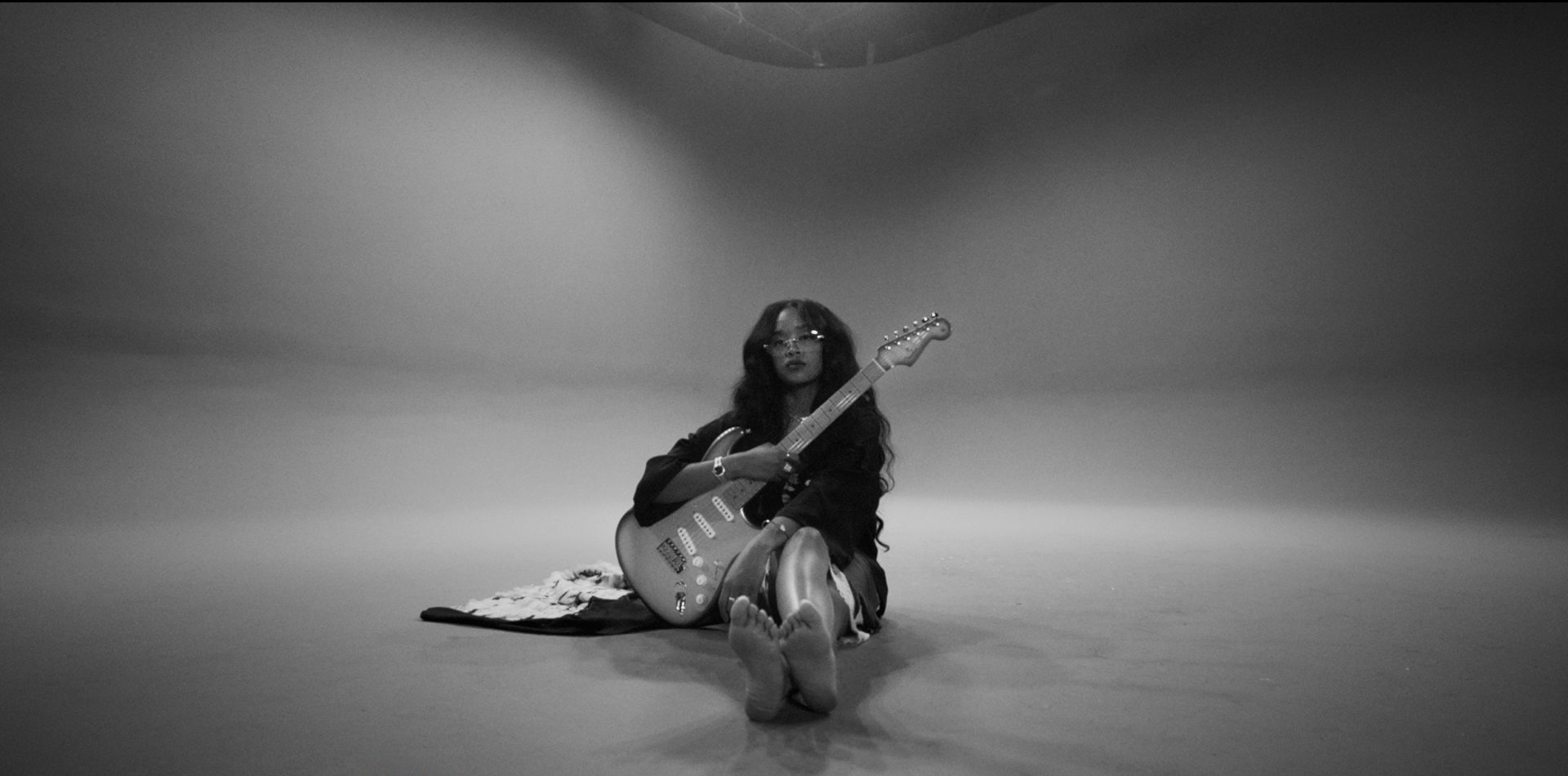September 29, 2021 at 06:01PM
When it comes to music, there doesn’t seem to be anything American R&B singer-songwriter H.E.R. (née Gabriella Sarmiento Wilson) can’t do. The 24-year-old artist has a series of hit EPs and a successful album (the much-anticipated Back of My Mind dropped earlier this year) to her name, has performed at the Super Bowl and has already won four Grammys and an Oscar.
But when it came to performing a full-length concert with an actual audience for the first time in about a year and half, how did she feel? “Nervous. I was so nervous,” she says, her laugh echoing out over the video chat. When we connect, it’s the day after H.E.R. had just performed two nights at the Hollywood Bowl alongside the Los Angeles Philharmonic, showing off her talents with rearranged versions of some of her greatest hits. “I was excited leading up to it, but then it hit me that it had been such a long time. I was like, ‘Am I going to have the stamina? Am I going to be on point?’ But then I settled in and I was very present and the nerves just went away,” she says. “The energy was insane — irreplaceable, honestly. It was an amazing experience.”
Next for H.E.R. is a project with the First Up with RBCxMusic program, which is dedicated to helping up-and-coming Canadian artists build a platform through exposure, funding, education and mentorship opportunities. As part of a new campaign called the First. Love., H.E.R. — an acronym for “Having Everything Revealed” — is advocating for something that has long been close to her heart: letting the music speak for itself regardless of the way an artist looks or identifies.
Ahead of the campaign launch, FASHION caught up with H.E.R. to discuss the message, her advice for young artists and her iconic Prince look.
View this post on Instagram
Let’s start with the First. Love. campaign. Why did you want to be involved?
One of the things that is important to me as an artist is to encourage and inspire. When I was younger, there were artists and people who I looked up to who kind of extended themselves to me and helped me develop, grow and lended that support. It’s important for me do that for other artists. I’m noticing my impact — you don’t realize it when you’re in it, but being the first Black woman to collaborate with Fender Guitars, for example. I’ve realized that one of my purposes is to help other people, include other people, and let them know that, you know, I’ve been there before. This is the perfect opportunity to do that. [My career] didn’t happen just like that. But I think we forget that, because we see the product, we see the result of the hard work. We don’t see the blood, sweat, tears, the hours, the doubts and all of that stuff. So I’m here with RBC to be there to support these artists through that process, and that is a rare thing. The fact that I could even be that for somebody else is mind-blowing to me. I feel honoured.
What’s something you tell young artists about all the unseen hard work they have ahead of them?
One thing is patience. I got signed to RCA when I was 14 years old. Vol. 1 came out when I was 19. I took those years to develop, to learn my craft, to learn the music business — because it’s not just music. It’s called the music business for a reason. I was a student of the game and really [spent time] putting in my 10,000 hours. Because of social media, sometimes we think that things are going to happen fast, like “I’m going to make it big the second I get signed.” That’s not always the case. There are going to be lows, there are going to be highs. You have to trust the process, stick to your guns and make sure you stay true to you. You also have to make sure you’re doing right by people, and at the same time, make sure they’re doing right by you. There are all these little details that people don’t understand because we just see the lights and the action. But it’s these little things that matter.
Earlier in your career you often hid your face. How has this idea played a part in your work?
Oh gosh. We get so caught up in, you know, the likes, the looks, the gossip, the drama — all these things around music that we forget about the art. But that’s what matters the most to me. My dad used to say, “If you don’t love it without the money, you’re not going to love it with the money.” You’re not always going to be happy with where you are. There are going to be [thoughts] like, “Am I in the right place? Should I quit?” But you have to keep going. For me, [I had to] focus on the music and make sure that was the goal. You want to know who I am? They say the eyes are the window to the soul, but my music is the window to my soul. We keep it about the art and about working so hard for what we love.

You’re so young have already been recognized by the Grammys and even the Oscars. What have these accolades meant to you?
Man, it’s crazy. I always say, “It’s confirmation, not validation.” Sometimes we get caught up in the trophies and prizes — which are amazing and I’m so thankful — but they don’t define you as an artist. They can be career-defining, but they don’t define you and your art, which is something I want to make clear. All those things will come if you trust yourself and, like I said, become a student of the game and work hard. People will try to discredit it and say that it’s undeserving, but sometimes it’s good to be selfish and say, “I deserve this” and pat yourself on the back. Be proud of yourself and your journey.
How would you describe your personal style and the way it plays a role in how you present your work to the public?
The glasses kind of started off as a way to be mysterious — I didn’t want to hide, but earlier on, I wore these dark glasses on a very dim stage so that people couldn’t really see me. I wanted them to hear my music. Now, that’s become part of who I am and very much a part of my style. I love working with my stylist so much because we started working on the [looks] from the inside out, and that’s how it should be. It shouldn’t be about putting on the best, most expensive designer brands. My style is about putting things together that make me feel good, feel ready and really represent who you are as a person. So if I want to feel sensual or sexy and wear a dress, then I’ll do that. If I want to be chilling and just want to put on some sweat pants, then that’s what I’m doing. I’m not always going to be put together, the hair’s not always going to be laid — okay maybe it actually will be — but other than that…[laughs], style is when you can truly be you and lock into that.
I read that your Oscars look was an homage to Prince. What’s the story behind that?
What’s crazy is that I had this picture [of Prince] saved on my phone for so many years — way before I knew the Oscars would ever even be in the conversation. I had tried to recreate [his look in the photo] a few times, but it never worked out. Then, ahead of the Oscars, my stylist brought it back and I was like, “Oh my gosh, wait. This is the look.” And my stylist said, “You know, that’s the look Prince won his Oscar in.” I had forgotten about that detail. It was just a full circle moment. Peter Dundas, who designed my look, did an amazing job. And then to win and be on that stage…I felt like a princess.
The post H.E.R. Just Wants the Music to Come First appeared first on FASHION Magazine.
Read More Fashion News
Author Patricia Karounos | Fashion Magazine
Selected by CWC



